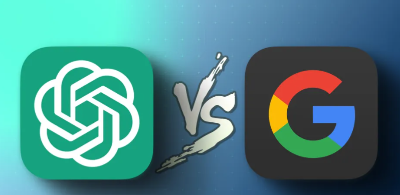With the launch of the real-time search feature by OpenAI, ChatGPT is gradually becoming a competitor to traditional search engines like Google. ChatGPT is known for its conversational answering style, which can provide real-time contextual information without advertising interference. ChatGPT and Google Search each have their strengths in answering questions, and their performance depends on specific needs such as information accuracy, timeliness, user experience, and cost efficiency.

ChatGPT
is an artificial intelligence conversation model developed by OpenAI. It was released in November 2021 and reached 100 million user records in February 2022. ChatGPT is able to perform various tasks, including answering your questions, generating text, translating languages, writing code, etc.
ChromeAI.org
is an artificial intelligence startup funded by Google. The company was founded in May 2021 with the goal of developing artificial intelligence models that can understand and generate human language. ChromeAI.org's first product is Whisper, an artificial intelligence application that can translate languages.
Data Algorithm PK
One of the main advantages of ChatGPT is that its data algorithm is very powerful. It is able to learn from massive texts and can generate high-quality texts. In contrast, ChromeAI.org's data algorithm is relatively small, but it is constantly improving.
Who is AI technology of the future?
ChatGPT and ChromeAI.org are both AI technologies of the future. They have their own characteristics and advantages, but both are capable of performing a variety of tasks and have the potential to play a greater role in the future.
Speed and Response Time
Question:"What are the best tourist attractions in Tokyo?”
Google: Google's search engine is very responsive, with results presented in milliseconds. Complete with images and links, it is powered by years of optimization and an infrastructure built for high-speed indexing and retrieval. For this prompt and other questions, I quickly got relevant results from multiple sources.
ChatGPT: ChatGPT's search was just as fast, but it generated images and information for each location, making it more clear and user-friendly. It was clear that the AI pulled information from relevant sources and shared the answers in a conversational format. The response felt more friendly, as if the AI was also excited about my upcoming trip.
Information Quality and Accuracy
Question: "Explain the difference between climate change and global warming. ”
Google: Google’s response, from Gemini, briefly outlined the difference between climate change and global warming. From there, I could scroll down to see links from NASA, USGS.gov, and even Quora. It’s clear that the algorithm prioritizes popular and authoritative sources, but the top results sometimes include sponsored content like the one I saw from Unilever for advertising-driven reasons. In addition, for complex topics, I often had to click on multiple links to piece together a complete answer.
ChatGPT: ChatGPT provides direct answers, pulling verified information from around the web and including clickable “source” icons. This feature reduces the time I spend pulling information from multiple sites in Google Search. For this search and others like it, ChatGPT’s summaries are spot-on, especially for general queries and more detailed topics, and its design makes for a cleaner, more focused experience. (Keep in mind that ads may appear in the future.)
Overall User Experience and Accessibility
Question: What TV is best for my living room?
Google: I typed “What’s” instead of “What is” and Google corrected me. Still, Google Several links, almost all of which were sponsored ads, were given to me to click on to find the right TV. With that answer, I felt like I needed to continue asking questions to narrow it down. However, below those sponsored links, there were links to content publishers, such as Tom's Guide's Best TVs page.
ChatGPT: ChatGPT search narrowed down my choices, provided images, and gave me the answers I was looking for. This AI really acts like a friend and provides valuable information. There are also short information descriptions next to each TV image. Compared to Google, the design looks simpler and the information is more concise. Moreover, the chat format is very intuitive, and I can scroll through the recommended TVs without having to click through multiple links to find the answer like on Google.
ChatGPT and Google each excel in different areas, but they meet slightly different needs. If you are looking for comprehensive search results with a wide range of resources and visuals, Google is still a powerful tool. However, if you prioritize clear, ad-free, conversational answers and need the ability to update in real time, ChatGPT provides a simple, user-friendly experience that may quickly become the tool of choice for daily queries.
